Teacher’s Perspective toward Alternative Assessment and Online Assessment in Iraqi EFL Context
DOI:
https://doi.org/10.32792/tqartj.v11i48.665Keywords:
Teacher’s Perspective, Alternative Assessment, Online Assessment, Iraqi EFL ContextAbstract
This study aimed to explore the perception of EFL teachers on traditional, alternative, and online assessments in EFL teaching and learning. The participants consisted of 60 Iraqi EFL teachers with varying degrees of teaching experience and diverse demographic backgrounds. The study utilized two questionnaires to collect data. The first questionnaire, developed by Rezaee, Alavi, and Shabani (2013), focused on teachers' attitudes towards alternative assessments and their usage in the classroom. The second questionnaire, adapted from Abduh (2020) by Momeni (2022), examined teachers' perceptions of online assessment. The results of the study showed that the majority of participants believed that alternative assessment is beneficial to learners, but it is not considered easy for correction. Participants also believed that both traditional and alternative assessment methods are necessary and should be practiced in the classroom. However, alternative assessment methods are seen as less practical and more time-consuming for teachers compared to traditional testing. On the other hand, the results of teachers’ perceptions on online assessment questionnaire showed that the majority of respondents agreed that online assessments help teachers improve their technological skills, enable faster entry of grades, and allow teachers to measure learning outcomes more accurately. However, many teachers stated that they encountered difficulties when it came to assessing students online, and online summative assessments were associated with anxiety. Technical difficulties such as an overloaded platform were one of the primary challenges during online exams. Additionally, many students submitted assignments that include a high proportion of plagiarism and are directly copied from websites without modification or paraphrasing. The findings of this study suggested teachers consider using a variety of assessment methods, including traditional, alternative, and online methods, to ensure that students are evaluated fairly and accurately.
Downloads
References
Beauchamp, T. L., & Childress, J. F. (2019). Principles of biomedical ethics. Oxford University Press.
Birenbaum, M., & Dochy, F. (2010). Alternatives in assessment of achievements, learning processes and prior knowledge. Springer.
Black, P., & Wiliam, D. (1998). Assessment and classroom learning. Assessment in Education: Principles, Policy & Practice, 5(1), 7-74.
Brown, G. T., & Hudson, P. (2015). The alternatives to traditional assessment should be considered more systematically. Educational Researcher, 44(4), 236-245.
Cizek, G. J. (2012). Setting performance standards: Concepts, methods, and perspectives. Routledge.
Deng, L., & Yuen, A. H. (2011). Towards a framework for educational assessment with technology. Journal of Educational Technology Development and Exchange, 4(1), 1-14.
Gulbahar, Y., & Tinmaz, H. (2006). A comparison of computer-based and paper-and-pencil-based testing environments: Effects on test takers' performance and attitudes. Journal of Educational Computing Research, 34(3), 229-243.
Momeni, A. (2022). Online assessment in times of COVID-19 lockdown: Iranian EFL teachers' perceptions. International Journal of Language Testing, 12(2), 1-24.
Resnik, D. B. (2021). What Is Ethics in Research & Why Is It Important? National Institute of Environmental Health Sciences.
Rezaee, A., Alavi, M., & Shabani, H. (2013). Teachers' perceptions of online assessment in higher education: A case study. Procedia - Social and Behavioral Sciences, 93, 1888-1892. https://doi.org/10.1016/j.sbspro.2013.10.097
Stiggins, R. J. (2001). Assessment literacy for the 21st century. Phi Delta Kappan, 83(10), 758-765.
Wang, L., & Chen, H. (2018). Chinese EFL teachers' attitudes toward online assessment: A mixed-methods study. Language Teaching Research, 22(4), 432-452.
Brindley, G. (2001). Task-centred assessment in language learning. ERIC.
Cho, Y. H., Kim, J. H., & Lee, J. H. (2020). The effects of self-assessment on EFL learners' speaking proficiency, motivation, and anxiety. Journal of Educational Research and Practice, 10(2), 1-14.
Colby-Kelly, E., & Turner, C. E. (2007). Evaluation: Gathering evidence and making judgments about teaching and learning. Journal of Nursing Education, 46(6), 282-285.
Hamp-Lyons, L. (1997). Alternative assessment and second language study: What and why? TESOL Quarterly, 31(3), 475-480.
Mazloomi, S., & Khabiri, M. (2018). The effect of self-assessment on EFL learners' writing performance and self-efficacy. Journal of Applied Linguistics and Language Research, 5(3), 1-14.
Monib, H., Al-Mekhlafi, A. G., & Al-Mamari, R. (2020). Alternative assessment in EFL classrooms: A review of the literature. Arab World English Journal, 11(4), 1-15.
Razmjoo, S. A., & Riazi, A. M. (2006). The relationship between EFL teachers' beliefs and their classroom practices. Journal of Faculty of Letters and Humanities, 53, 1-20.
Shohamy, E., Gordon, E., & Kraemer, R. (2017). Language testing and assessment: An advanced resource book. Routledge.
Zohrabi, M., Ghonsooly, B., & Khajavy, G. H. (2012). The relationship between EFL teachers' beliefs and their classroom practices. Journal of Language Teaching and Research, 3(6), 1184-1192.
Published
License
Copyright (c) 2024 Ali Abd

This work is licensed under a Creative Commons Attribution 4.0 International License.
The journal applies the license of CC BY (a Creative Commons Attribution International license). This license allows authors to keep ownership of the copyright of their papers. But this license permits any user to download, print out, extract, reuse, archive, and distribute the article, so long as appropriate credit is given to the authors and the source of the work. The license ensures that the article will be available as widely as possible and that the article can be included in any scientific archive.



















